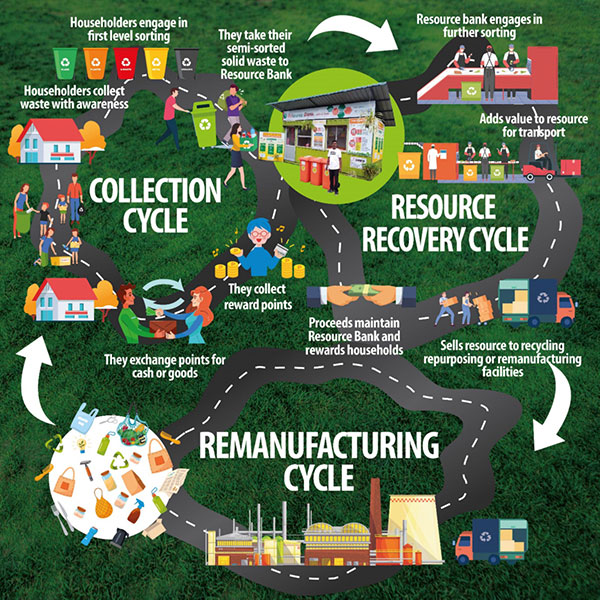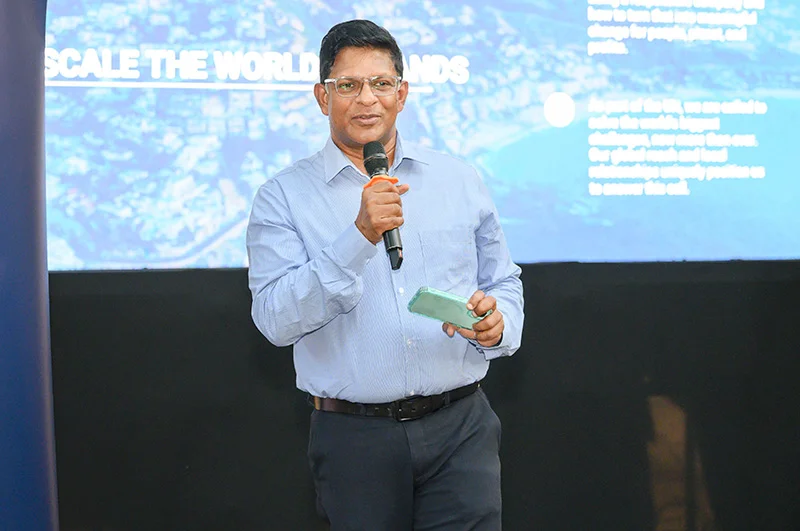Business
‘Let us refuse to call it refuse’

by Arjuna Senarathna
When a country is in crisis, every little saving, every small opportunity, every tiny chance must be seized with alacrity. If a single person refuses to buy foreign made goods because they are automatically subsidized by the defence of the rupee against the dollar that is indeed an opportunity taken to save something not only for the family but for the nation as well. If the entire nation stops purchasing them, then the saving will be massive. What is needed is an increase in knowledge, a deepening of awareness and the bravery to break a bad habit and take on a better and more meaningful one. It is not easy because the chance is hidden by habit that must first be stripped off for the potency of a small act to be revealed.
It is the same with the massive amounts of material we bring into our homes only to discard them by giving it the derogatory names “garbage”, “waste” and “refuse”. The issue here is that a chance is hidden at the point of its acquisition. When a person buys say… butter, that person has trained him or herself to think “I bought 500g of butter”. However, the reality is that the person has bought a plastic bag, a cardboard pack, a cellophane wrapper whose costs have been added to the butter. Well, we can consume the butter but can we consume the unasked for other “purchases” that we paid for? What do we do? We are mad enough to throw something we bought out the window. We feel we cannot deal with it. Having admitted to incompetence, we let the garbage collector and the municipal council or urban council have a go at solving the problem. Do they? No. They cannot solve it either. That is why they too try to get rid of it either in a hole in the ground or piled up into a mountain that subsequently proceeds to poison thousands and kill a few dozen on April 14th of this year or that.
In a nation in crisis, to continue with that bad practice is the worst thing imaginable when every bit and piece becomes precious and wasting anything for any reason whatsoever is a sacrilege.
Suppose a household or a workplace were to gather all of these inadvertently purchased materials and sell it? In an instant, the refuse has turned into a resource. For a typical family, it means that there is at least a few kilograms of material to sell a day. For a nation of 21 million people? If done right, it can only be called one word: “wealth”.
What is needed is increased knowledge of the potency of something that has hitherto been discarded. What is needed is a heightened awareness that with every bit of such material that is thrown away, a family is actually losing money. What is needed is a painless system through which they can get the material to a buyer who will pay cash on the barrelhead.
With World Vision’s PHILA project, such a system is indeed in place. With resource banks (not collection centres or garbage point since it is a resource of significant economic value), placed at strategic locations in three locales where the method was pilot tested, resounding success was seen as outlined in the diagram.
They will now proceed to make this a whole-of-nation effort with all local government officials getting involved when they hold their national forum to upscale its success to the entire island.
In a time of crisis, it is indeed a fantastic opportunity for each and every one of us to execute our responsibility as citizens, break bad habits and take on the challenge of reimagining our country as a clean island without actually trying too hard.
It only requires people to change their mind set. It only requires them to refuse to call it refuse. It only requires them to call it a resource. It only requires them to call it cash.
Business
Embedding human rights, equity and integrity into business leadership

At its 2026 Social Sustainability Programme Kick-Off, the UN Global Compact Network Sri Lanka convened business leaders to advance the translation of global ambition into practical corporate action on inclusion, integrity and human rights.
On 24 February 2026, the UN Global Compact Network Sri Lanka (Network Sri Lanka) convened business leaders at Barefoot Garden Café for its 2026 Social Sustainability Programme Kick-Off, delivered in collaboration with Good Life X.
The gathering did more than introduce a calendar of events. It positioned Sri Lanka’s corporate community within the broader direction of the UN Global Compact’s 2026–2030 global strategy — a strategy anchored in three imperatives: equipping companies to act, catalyzing collective action, and advancing the business case for responsible leadership.
At its core, the 2026 Social Sustainability agenda is designed to move companies from commitment to capability.
Within the Diversity & Inclusion Working Group, this means building practical pathways toward equal pay for equal work and strengthening male allyship as a governance issue rather than a cultural afterthought. It means examining sexual and reproductive health, disability inclusion, and mental health not as employee benefits, but as structural determinants of productivity and retention. It means sharpening strategic communications so inclusion is embedded in brand integrity. It also means applying science-based behavioural change approaches to shift organizational culture in measurable ways.
Across the Business & Human Rights Working Group, equipping companies takes the form of deepened engagement on decent work and living wage implementation, strengthening human rights due diligence processes, and addressing emerging risk areas such as AI and digital rights. It extends to reinforcing business integrity and anti-corruption frameworks, understanding the social dimensions of a just transition, and recognizing the link between child rights, nutrition, and workforce productivity.
Business
Union Bank to raise LKR 3 Bn via Basel III Compliant Debenture Issue

Union Bank of Colombo PLC announced its proposed Debenture Issue 2026, a strategic move aimed at raising up to LKR 3 billion. This issue is designed to bolster the Bank’s Tier II capital base and provide a robust financial foundation for its upcoming growth initiatives.
The offering consists of Basel III compliant, listed, rated, unsecured, subordinated, redeemable high-yield debentures with Non-Viability Conversion. The instrument has been assigned a rating of BB (lka) by Fitch Ratings (Lanka) Ltd, reflecting the bank’s creditworthiness and the structured nature of the subordinated debt.
Investors can choose from three distinct interest structures starting from a high-yield 13% fixed rate per annum (Type A). This option is paid annually, while Type B offers a 12.5% fixed rate paid semi-annually (12.89% AER). For those seeking market-linked returns, Type C provides a floating rate of the 182-days Treasury Bill rate plus a 400-basis point margin, also paid semi-annually.
The debentures are priced at LKR 100 per unit with a 5-year tenure (2026–2031). The initial issue size is set at 20,000,000 debentures with an option to raise 10,000,000 at the discretion of the Bank and is scheduled to open on 10 March 2026.
Shanka Abeywardene, Chief Financial Officer of Union Bank stated “This debenture issue marks a significant step in the Bank’s journey towards enhanced financial stability. By strengthening its capital adequacy, Union Bank is well-positioned to navigate evolving market conditions while fuelling its long-term strategic objectives for sustainable growth”
Business
Sanjay Kulatunga appointed to WindForce Board

WindForce PLC announced the appointment of Sanjay Kulatunga as an Independent, Non-Executive Director to its Board with effect from 03rd March 2026, following the resignation of Dilshan Hettiaratchi. The appointment further strengthens the Company’s governance framework, strategic oversight, and long-term decision-making capabilities.
Kulatunga brings an established track record as a founder, entrepreneur, and senior executive across financial services and export-oriented industries. He is the Chief Executive Officer and Co-Founder of LYNEAR Wealth Management, a boutique investment firm established in 2013, which has since grown to become one of Sri Lanka’s largest private wealth management institutions, serving high-net-worth individuals as well as local and international institutional clients.
Prior to founding LYNEAR, Kulatunga played a pivotal role in the establishment of Amba Research, an investment research offshoring firm rooted in Sri Lanka and now operating as part of Acuity Analytics.
Over the years, he has contributed extensively to several key national institutions. His previous appointments include serving on the Financial Sector Stability Consultative Committee of the Central Bank of Sri Lanka, as well as the Board of Investment of Sri Lanka and the Securities and Exchange Commission of Sri Lanka.
-

 Features4 days ago
Features4 days agoBrilliant Navy officer no more
-

 Opinion7 days ago
Opinion7 days agoJamming and re-setting the world: What is the role of Donald Trump?
-

 Features7 days ago
Features7 days agoAn innocent bystander or a passive onlooker?
-

 Opinion4 days ago
Opinion4 days agoSri Lanka – world’s worst facilities for cricket fans
-

 Business7 days ago
Business7 days agoAn efficacious strategy to boost exports of Sri Lanka in medium term
-

 Business1 day ago
Business1 day agoCabinet nod for the removal of Cess tax imposed on imported good
-

 Features4 days ago
Features4 days agoA life in colour and song: Rajika Gamage’s new bird guide captures Sri Lanka’s avian soul
-

 Features5 days ago
Features5 days agoOverseas visits to drum up foreign assistance for Sri Lanka













